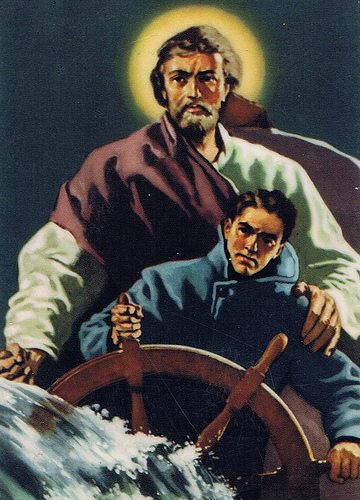Closeness of the Comrade-in-arms to the Hero: The Ignatian’s At-one-ment with Jesus Christ in His Mission
From admiration through ever closer following of the hero by the willingness to embrace pain and yes, even death, for the sake of the hero and the hero’s mission, the Ignatian finally becomes the hero’s comrade-in-arms. His status as a fallen and fragile man remains but the supernatural power emanating from the Crucified and Risen Christ has transformed his nature.
It is no longer just an acquaintance’s admiration based on the personal qualities of the hero; it is not even the devotion of a dedicated follower or friend; it is an identification with the hero and with his mission: the friend has taken his hero’s thoughts, aspirations, plans and goals for his own. By travelling along the roads of Middle-Earth with him, accepting his invitation “Learn from me..”(Mt.11:29), he had come to put on “the mind of Christ” (1 Cor 2:16).
Ever following in the Hero’s footsteps, the Ignatian realizes that the journey is a continuous ascent upwards to Jerusalem through purification and enlightenment to “at-one-ment”. The priest never wants to hear repeated the words once addressed to the first priest after he sought to prevent the Hero from journeying to his doom: “Get behind me Satan! You are a hindrance to me; for you are not on the side of God, but of men.”(Mt.16:23) Upwards, ever upwards to Jerusalem the priest follows his hero; enduring the blaze of the midday sun, his eyes are fixed on the Hero for the duration of the journey until the ring is cast into the furnaces of Mount Doom and Middle-Earth is set free; refusing to leave the Hero, no matter the danger, no matter the pain; grateful for the meritorious value of his sacrifice united to Christ’s for the salvation of the world.
The Ignatian follower becomes one with the mission of the Hero, accepting it as his own : praying, evangelizing, converting, absolving, baptizing, anointing, healing, preaching, teaching, organizing – all that Christ willed to leave to his loyal friends and co-workers. He now has a christified character: the essence of the unitive stage. Thus, he is willing to share unconditionally in the ordeals and struggles, sacrifices and pain of his hero: here the “at-one-ment” finally occurs when he knows that deep within him he is a new man with “the mind of Christ” and is capable of saying in utter sincerity: “It is no longer I who live but Christ who lives in me; the life I now live in the flesh I live by faith in the Son of God who loved me and offered his life up for my sake.” (Gal 2:20).
In this way the Ignatian arrives to be an intimate follower of The Hero of History, one of those chosen by Him to perpetuate his mission for mankind’s liberation until His Second Coming: those to whom he said before his agony “No longer do I call you servants, for the servant does not know what his master is doing; but I have called you friends, for all that I have heard from my Father I have made known to you.” (Jn.15:15). These were the first priests with Peter at their head and they knew their master’s business in a way unknown to the other disciples because the Hero had related them to himself and to his mission in the most intimate way possible by the priestly election and ordination: “You did not choose me, but I chose you and appointed you…so that whatever you ask the Father in my name, he may give it to you” (Jn 15:16)
They, his priests, would have that sacramental quality by which they would be different from the other Christians but it would be a difference that meant not just a sharing in the divine glory but in the weight of glory. Glory because they would be closest to the Hero since whenever they offered the sacrament of the Sacrifice on which the salvation of the world depends, they would be with him mystically on Calvary; weight of glory because he had chosen them to accompany him through the desert of history as warrior-leaders of the Ecclesia Militans, battling with the powers of evil, resisting the onslaught of the prince of Darkness for whom they would be prime targets.
He would ask them to accept the fact that his prophecy would come true -“but because you are not of the world, but I chose you out of the world, therefore the world hates you”( John 15:19); the world would alternate in its reactions to the priest between the shouts of welcome on Palm Sunday and the death-cries of Good Friday. He would ask them to lean not on human wealth and power but on his words: “In the world you will have tribulation; but be of good cheer, I have overcome the world.”(Jn 16:33)

